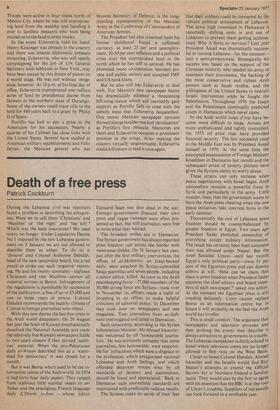Death of a free press
Patrick Cockburn
During the Lebanese civil war reporters faced a problem in describing the antagonists. Were we to call them 'Christians' and 'Muslims' or 'the right' and 'the left'? Which was the least inaccurate? We need worry no longer. Under Legislative Decree No I imposed by the new Lebanese government on 3 January we are not allowed to describe them as either. To do so is 'divisive' and Colonel Anthoine Dahdah, head of the new censorship board, has a red pencil to strike out such 'negative' reporting, He and his twenty assistants—eighteen Christians and two Muslims—censor all material written in Beirut. Infringement of the regulations is punishable by suspension of the publication, a fine of up to £5,000 and one to three years in prison. Colonel Dahdah recommends the healthy climate of Cyprus to foreign journalists who object.
With this new decree the last free press in the Arab world disappears. On 29 August last year the Amir of Kuwait simultaneously dissolved the National Assembly and made the relatively free Kuwaiti newspapers liable to two years closure if they printed 'seditious' material. When the pro-Palestinian daily al-Watan described this as a 'watershed for democracy' it was closed for a month.
But it was Beirut which used to be the information centre of the Arab world. In 1974 it had forty-four daily papers. They ranged from scabrous little scandal sheets to anNaha,' and the prestigious French language daily L'Orient le-Jour — whose editor
Edouard Saab was shot dead in the war. Foreign governments financed their own press and vague rumours were often presented as fact, but still journalists were free to write what they wanted.
The broadest smiles are in Damascus. The Syrian government has always regarded press freedom just across the border with venomous dislike. On 31 January last year, just after the first military intervention, the offices of al-Moharrer, an Iraqi-backed daily, were attacked by Syrian-controlled Saiqa guerrillas and seven people, including a senior editor, killed. As soon as the Arab peacekeeping force-27,000 members of the 30,000 strong force are Syrians—took. over in November its officers made a habit of dropping in on offices to make helpful criticisms of editorial policy. In December they took over six newspapers and one magazine. Two journalists from as-Safir were interrogated and jailed in Damascus.
Such censorship, according to the Syrian Information Minister, Mr Ahmed Iskandar, was welcomed by all 'honourable journalists.' He was extremely unhappy that some journalists, less honourable, were responsible for 'infractions which were a disgrace to the profession, which antagonised national Lebanese and Arab feelings, and which offended deterrent troops who by all standards of decency and nationalism, should be loved and appreciated.' Back in Damascus such journalistic standards are maintained with predictably tedious results.
The Syrians make no secret of their fear that their soldiers could be corrupted by the vibrant political atmosphere of Lebanon. The army high command in Damascus is reportedly shifting units in and out of Lebanon to prevent them getting acclimatised. Why is Syria so nervous? Last year President Assad was dramatically successful in turning Lebanon—for the moment— into a semi-protectorate. Strategically his success was based on the support of the Christian minority who needed his army to maintain their dominance, the backing of the most conservative and richest Arab powers such as Saudi Arabia, and the willingness of the United States to restrain Israeli intervention while he fought the Palestinians. Throughout 1976 the Iraqis and the Palestinians continually predicted coups in Damascus which never came.
In the Arab world coups d'etat have become more difficult to stage. Armies are more sophisticated and tightly controlled, the 1973 oil price rises have provided financial security. The last successful couP in the Middle East was by President Assad himself in 1970. At the same time the attemptecrassassination of Foreign Minister Khaddam in Damascus last month and the subsequent arrest of seventy plotters have given the Syrians plenty to worry about.
These strains can only increase when peace negotiations with Israel begin. Arab nationalism remains a powerful force In Syria and particularly in the army. Little wonder, then, that the government wants to have the Arab press cheering when the new peace initiatives take concrete form in the early summer.
Theoretically the end of Lebanese press freedom should be counterbalanced by greater freedom in Egypt. Two years ago President Sadat abolished censorship of everything except military information. The result has certainly been freer comment than was allowed under Nasser. But the Arab Socialist Union—until last month Egypt's only political party—owns 51 Per cent of the Egyptian press and can dismiss editors at will. 'How can we claim that there is press freedom when President Sadat appoints the chief editors and board members of each newspaper'?' asked one editor. At the moment the Egyptian press is still treading delicately. Cairo cannot replace Beirut as an information centre but in future it will probably be the best the Arab world has to offer.
This is small comfort. The argument that newspapers and television provoke and then prolong the events they describe Is always attractive to governments in trouble. The Lebanese clampdown is dimly echoed In Israel where television crews are no longer allowed to film riots on the West Bank.
Closer to home Colonel Dahdah, Ahmed Iskandar and the Israelis would find ROY Mason's attempts to extend the Official Secrets Act in Northern Ireland a familiar tactic. They would also be the first to agree with his assertion that the BBC is at the root of Ulster's troubles. Suppliers of red pencils can look forward to a profitable year.


































 Previous page
Previous page